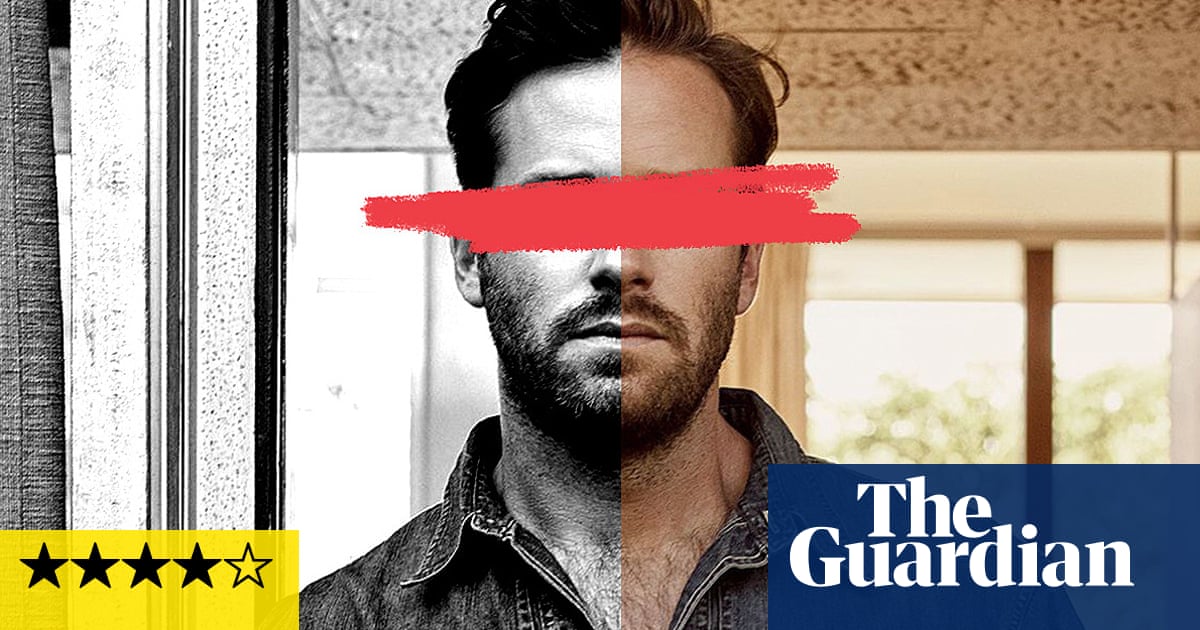
House of Hammer review – the dark truth about Armie Hammer’s downfall
“I tried watching Succession,” says Armie Hammer’s aunt Casey, somewhere near the halfway point of House of Hammer (Discovery+). “I had to turn it off … Magnify Succession a million times and it was literally my family.” This, it turns out, is not hyperbole.
The career of Armie Hammer, star of The Social Network and Call Me By Your Name, ended virtually overnight last year, when the internet lit up with rumours (all of which he denies) of emotional and physical abuse. A direct accusation of rape followed, for which Hammer was investigated but not charged. Three-part documentary series House of Hammer recaps this sorry story then goes further, showing the disgraced actor to be the product of extraordinarily toxic privilege, and pitching his downfall as a battle for the ages: the corrosive influence of old money versus the untameable power of new media.
The first episode’s key interviewee is Dallas entrepreneur Courtney Vucekovich, who says she connected with Hammer via Instagram in late 2019. She claims that when they finally arranged to meet in the summer of 2020, their interactions were disturbing from the start. According to her, Hammer left a note reading “I am going to bite the FUCK out of you”, after turning up at her apartment to find her out of town. “I chose to look at it as more flattering than concerning,” Vucekovich recalls. Their first sexual encounter left her traumatised, she says, so she distanced herself from Hammer. But, we hear her claim that he tracked her phone’s location and turned up unbidden to beg forgiveness: “I thought it was romantic. I thought, ‘He’s fighting for me.’” Further meetings, Vucekovich says, left her with visible handprints and deep bite marks on her body, which she claims she was encouraged to wear like trophies. “I was interpreting that as love. Looking at it now makes me sick.”
Vucekovich’s story seems absurdly naive in the retelling, but that’s her point. Her account appears courageous and valuable because it demonstrates how, if true, anyone could be vulnerable to coercion and abuse. She is a smart, articulate, successful woman who says she nevertheless ignored what she now believes to have been the reddest of flags.
In January 2021 another woman, known as Effie, went public, sharing what she claimed were screenshots of messages from Hammer revealing his sinister, controlling behaviour and a cannibalism fetish. Vucekovich says she recognised the pattern, and the documentary also talks to two further women who claim to have had similar experiences.
With Hammer comprehensively cancelled – his agent and publicist dropped him and movie roles evaporated – something odd and very modern happened, powered by social media’s propensity for hive-mind sleuthing. A TikTok user went viral simply by finding a copy of Casey Hammer’s self-published 2015 memoir Surviving My Birthright and summarising, chapter by chapter, its account of abuse and excess in the Hammer family, and its suggestions that the rot had been festering for generations.
House of Hammer expands on this book, with Casey as a consultant and the main interviewee of episode two. The dynasty is traced back to Armand Hammer, Armie’s great-grandfather who, as the main stakeholder in Occidental Petroleum, was quietly one of the 20th century’s most powerful men. We hear how his huge wealth and lack of qualms about bribery and blackmail enabled him to do whatever he wanted.

Armand bantered with Brezhnev and hobnobbed with Reagan; he was convicted of illegally donating to Richard Nixon’s Watergate fund, but later pardoned by George HW Bush. These big names are thrilling but for British viewers there’s a sudden chill of recognition when Prince Charles and Lady Di appear. A sticky tale plays out about large charitable donations, glittering galas and the PR drive that meant Occidental largely got away with the 1988 Piper Alpha disaster, which happened on one of its rigs in the North Sea.
Armand Hammer was a man for whom money bought impunity. His life story, combined with that of his unwanted, bitter son Julian, who ran his LA home like a less avuncular Hugh Hefner (and whose own son, Michael – Armie’s dad – would grow up determined to destroy him, according to Casey) suggests Armie Hammer’s background as one where extreme privilege was both the cause of and, in reputational terms, the solution to some horrific conduct. Logan Roy et al have nothing on them.











































































